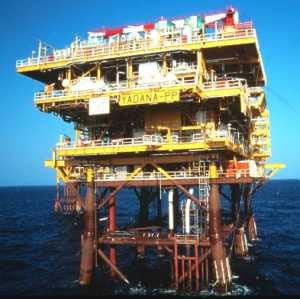Talk of Myanmar’s burgeoning natural resource industry has been simmering for sometime and many of the world’s largest oil and gas firms have been waiting to get a slice of this promised land since trade restrictions were lifted more than a year ago.
 In April, the Myanma Oil and Gas Enterprise (MOGE) announced: “potential bidders will be allowed to submit three proposals for any three offshore blocks (shallow water or deep water or both).”
In April, the Myanma Oil and Gas Enterprise (MOGE) announced: “potential bidders will be allowed to submit three proposals for any three offshore blocks (shallow water or deep water or both).”
On Friday, following an initial delay while the government improved transparency in the process, the final tender closed. Fifty-nine companies are now vying for 18 onshore blocks and 30 offshore blocks.
“This tender is different from other tenders in Myanmar at the moment,” said Alessio Polesstri, a Yangon-based lawyer at an oil and gas summit on Monday in Yangon’s Sedona Hotel. “The proposal is final and there will be no chance to amend it afterwards.”
Bids are hinged on a crucial environmental impact report highlighted by the government body.
Speaking at the event, Kenneth Stephens, managing partner of Leopard Capital, warned prospective investors to take heed from last year’s halting of the Myitsone hydro dam project.
“If they had done a proper Environmental Impact Assessment (EIA), they may have saved themselves,” said Stephens of the controversial China-backed project.
New draft legislation being proposed by the government could ensure that no natural resource company be granted a license until it is given a green light by the EIA Commission.
Pre-qualified bids will be announced by the MOGE during the first half of July. The winning tenders are expected to be revealed within eight to 10 months.
However, winning companies will face new challenges being addressed by all companies entering Myanmar, including underdeveloped infrastructure and lack of human resources.
Notably absent from the Oliver Kinross-organized event on Monday was billed participant and opposition leader Aung San Suu Kyi. Earlier this month, the Nobel Peace Prize laureate spoke out about extractive industries at the World Economic Forum when she highlighted that the industry did not create a lot of jobs.



